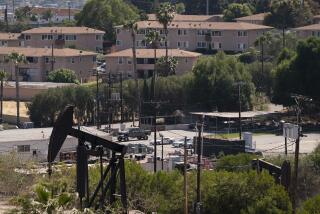Deep Hole to Test Scientist’s Theory on Oil : If Maverick Thinker Is Right, Vast Quantities Could Be Made Available
- Share via
A maverick scientist from Cornell University has persuaded the Swedish government to drill a deep oil well in an area where no oil should be found to prove his theory that oil and gas come from the Earth’s molten core and should be available in virtually unlimited quantities.
Thomas Gold, an astronomer who has been at the forefront of many scientific breakthroughs during his long career, maintains that conventional wisdom is wrong and that hydrocarbon deposits such as the giant oil fields of the Middle East did not result from the decay of organic materials.
Gold has been trying for eight years to convince petroleum engineers and geologists that oil and gas have been present since the planet was formed about 4.5 billion years ago, and that deep deposits migrate up, apparently through geological fracturing, to wells from which petroleum is extracted.
This fall the government of Sweden will drill a 15,000-foot-deep well in a granite formation--which should not contain oil because it was formed long before organic materials existed--to see if Gold is right.
Convention Winds Up
“I hope a year from now I won’t have to debate this with anyone else again,” Gold said during a symposium sponsored by the American Assn. for the Advancement of Science, which concluded its six-day convention in Los Angeles on Friday.
If it turns out that Gold’s theory is correct, it will astonish petroleum geologists around the world.
“Most professional geologists disagree with Gold,” said George Chilingar, professor of petroleum engineering at the University of Southern California. “I think 95% would disagree with him. All evidence points to the organic origin of oil.”
Part of the cost of the Swedish project is being borne by the Gas Research Institute of Chicago, founded in 1976 by the natural gas industry.
“We think there’s merit in pursuing his line of research,” Ferol Fish, manager of physical science programs for the institute, said in a telephone interview.
Scientific Maverick
Gold is known as a maverick among fellow scientists, partly because he has advocated positions long before they became commonly accepted. Before the first scientific instruments were landed on the moon, for example, he predicted correctly that the lunar surface consisted mostly of a fine, powdery dust rather than hard, volcanic rock.
The astronomer turned his attention to petroleum deposits nearly a decade ago because, he said, he found the idea of organic decay as the source of hydrocarbons inconsistent with what he had learned about the origin of the universe.
When scientists first suggested that hydrocarbons were produced biologically, Gold said, they did not know that hydrocarbons are a major constituent of other planets, their satellites and comets. He added that carbon is now believed to be the fourth most abundant element in the solar system.
Carbon compounds trapped beneath the Earth’s crust are subject to intense heat, which causes them to release hydrocarbons, some of which migrate toward the Earth’s surface where they are tapped by wells, Gold said.
He cited the massive oil fields of the Middle East as proof of his theory.
Points to Mideast
Geologists have long maintained that oil and gas are formed when organic materials are trapped in sedimentary formations. But Gold argues that the oil fields of the Middle East are comprised of geological formations and rocks of vastly differing character, and yet that area boasts “possibly as much as 60%” of the Earth’s oil.
The suggestion that organic decay placed such a disproportionate percentage of the Earth’s oil in one geologically inconsistent area is “ludicrous,” Gold said.
Although the geology of the Middle East varies widely, he said, the oil itself is consistent and is easily distinguished by chemical analysis from oil found in other regions of the Earth.
This would suggest that oil throughout the Middle East comes from a common source deep within the Earth, Gold said, rather than shallow fields created by organic decay.
The scientist said he turned to Sweden several years ago when he set out to discover commercial quantities of gas where such discoveries would be “extremely surprising” to supporters of the biological theory. He found his natural test lab in the Scandinavian nation.
Sitting on Granite
Part of Sweden is on granite, which should not contain oil because it was not formed through sedimentary processes, Gold said. Yet small quantities of oil and gas have been found there over the years.
Gold became convinced that a meteor that crashed into the granite 360 million years ago, creating a 28-mile-wide crater, fractured the rock to such depths that hydrocarbons have migrated to the surface. Fascinated with Gold’s theory, the Swedish State Power Board drilled seven wells in the crater and found gas at a depth of about 2,000 feet.
Sweden has spent $1 million researching the project and has committed several million more dollars on the 15,000-foot well, Gold said.
That is about the depth of many producing oil wells around the world. But if this one strikes a significant amount of oil, it could bury a lot of theories about the world’s supply of hydrocarbons.






